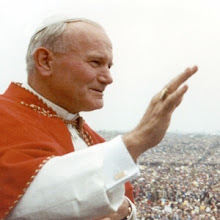Really, the last (and I would argue only) revolution to hit our world is Christianity. Christianity is the last cultural change that actually put the world as anyone knew it on it's head. Have you ever read the beatitudes? The meek will inherit the earth. What!?! Who thought of that? - Um... God. The world looks different and less frightening when you begin to see that the world isn't fundamentally about the marketplace, politics and power, it's about culture. Culture expresses a worldview and our most fundamental beliefs about man. Christianity flies in the face of all the other answers our world has tried to give to the question of man. The secular world has produced such responses as Nazism, Communism, racism, Fascism, sexism, ageism, the gospel of health and wealth, consumerism, utilitarianism, Atheism, etc. What have all of these -isms had in common? They all fundamentally misunderstand who and what the human person is. Why? Because we don't understand the human person and his deepest longings and desires by becoming a society of navel gazing narcissists. The meaning and dignity of human life isn't self-contained. It's other contained. Our dignity comes through our being created for something greater than this life. Created for eternity...created for another... created for love.
"Love, love, love, blah, blah, blah..." you might be thinking. I don't blame you. Our world has reduced the word love to an utterly pathetic puddle of sentimental goo. We need to really ask, "what is love?". Again, Christianity has an answer for that. God is love. It's the ever existent (outside of time and space) eternal exchange that takes place in the Trinity. Um... yes, it's a mystery. The key to understanding a mystery is that you don't understand it from outside - you enter into it. It's messy and unclear, but more real than empirical science. In fact, this reality is the basis by which empirical science can express truths. What I mean to say is that unless there is something grounding all of existence (and therefore humanity too) we can't prove anything - we're reduced to pure relativism. If we're reduced to relativism, then empirical science doesn't tell us anything about the truth, but merely about a set of physical parameters that can be predicted and reproduced. Thus, we would be left claiming to know nothing about humanity... kinda like Barack Obama... he doesn't know when life begins.
Now, the key to being able to speak about the Trinity is to recognize that it is always infinitely greater than what you can say about it. That's just the problem of speaking about something infinite and eternal. Unless you're greater than infinite and eternal (which implies that the other infinite and eternal is really finite and temporal) you don't have the tools to exhaust the subject. That doesn't, however, mean that we can't say anything. We can say "God is", for example. We can say all kinds of things about God. But what does this have to do with a cultural revolution? Everything! If the interior processions of the Trinity are not the basis of existence, then existence is entirely disconnected from and unrelated to love. But wait, there's more! If, we can say that God the Father gives himself, in all eternity, completely over to the Son, who receives all that the Father is and has and makes a return of all that he has received in gratitude and obedience, then we can say that their giving and receiving constitutes (eternally - so always-already) the existence of a third... a Holy Spirit: a name which both describes and defines at the same time. He is Holy (i.e. not possesses holiness, or feels holy, or looks holy, but "IS" holy). He is Spirit - the spirit of the eternal exchange of love between Father and Son that is so real it expresses itself in generation. Existence that is so powerful it can create... hmm... then that means that being created is synonymous with being loved. That is to say, all of creation is the direct result of a freely given, and unmerited act of love. Wow! I'll be damned if that doesn't fly in the face of all those -isms mentioned above. Can you imagine being loved for no other reason than because you exist - and being loved for who you are?
The only way that man, as well as the rest of creation (puppy dogs and baby seals included), has any dignity or worth, is if at the heart of all creation and all existence is this freely given and unmerited love. That is what drives and sustains the world. That is the deepest longing of man's heart. That is the basis of what Christianity knows and proclaims to be the foundation of human dignity and culture. You see, man is not only created from this divine love that is eternal, freely given, and undeserved - but he's also invited to it. He is invited to share in this eternal exchange. Now, put that at the heart of your worldview and you'll get a cultural paradigm shift that will keep things spinning for at least a couple thousand years. That's what we call the Catholic Church. Christ came to show us what we were really made for and to free us from slavery to sin so that we could have access to this eternal exchange of love. In the end, Jesus Christ reveals to us not only who God is, but he "fully reveals man to himself."(GS 22)
